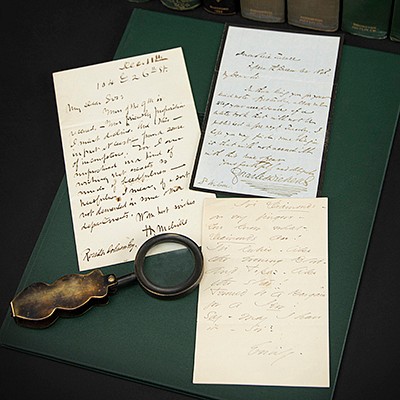Victor Hugo Handwritten Draft Poem of 'God'
Two ways to bid:
- Leave a max absentee bid and the platform will bid on your behalf up to your maximum bid during the live auction.
- Bid live during the auction and your bids will be submitted real-time to the auctioneer.
Bid Increments
| Price | Bid Increment |
|---|---|
| $0 | $5 |
| $50 | $10 |
| $200 | $25 |
| $500 | $50 |
About Auction
Oct 12, 2022
RR Auction support@rrauction.com
- Lot Description
Magnificent handwritten draft of seven lines of poetry by Victor Hugo, unsigned, no date, penned on an off-white 4.25 x 2 sheet, containing multiple verses from his great philosophical poem ‘Dieu’ or ‘God,’ which references Prometheus, the celestial fire, and Mount Olympus. It should be noted that this version contains several differences from the published version and that the vertical stroke indicates that Hugo copied these verses in a later document. The verses, transcribed in French, read, in part (loosely translated): “(Heavenly fire burning on Mount Olympus)— / …But Prometheus took the flame and man can / To be in turn Titan and even Gods he wants / If he knows how to fight, think, climb…embrace / And if he doesn't let the big torch go out / For two divine rays make up the clarity / And one prisoner and the other is beauty.” In fine condition. Hugo donated his literary manuscripts to the French National Library and himself destroyed many first drafts like this one. Such documents are consequently scarce in private hands and remain the best testimonies to the creative process of the illustrious author.
‘Dieu’ is a long poem published in 1891, six years after the death of its author, Victor Hugo. But, according to his daughter, Adele, the section, now titled ‘Dieu,’ first called SOLlTUDINES COELl, was read by the author to his family at home on May 2, 1855. So it begs the question of why it was not published until 1891. Extracts of Hugo's correspondence with his editor discovered that the author requested that the title be modified several times; after calling it SOLlTUDINES COELl it was then to be named ASCENSION DANS LES TENEBRES, or ‘Ascent into darkness.’ On February 12, 1856, Hugo suggested that the title be changed to ‘DIEU’ and that this lone word be written in big letters whereas his own name be printed in very small letters. Another edition of the work shows it with the subtitle ‘L'Ocean d'en haut’ (or The Ocean of the Heights), and another edition with a different title, ‘La Voix du Gouffre’ (or The Voice of the Chasm). In March 1857, the publisher advised Hugo of the impossibility of publishing this text due to the current religious climate, which, points squarely to the poem’s late publication: censorship. Indeed Baudelaire's Les Fleurs du Mal were condemned a few months later. - Shipping Info
-
Bidder is liable for shipping and handling and providing accurate information as to shipping or delivery locations and arranging for such. RR Auction is unable to combine purchases from other auctions or affiliates into one package for shipping purposes. Lots won will be shipped in a commercially reasonable time after payment in good funds for the merchandise and the shipping fees are received or credit extended, except when third-party shipment occurs. Bidder agrees that service and handling charges related to shipping items which are not pre-paid may be charged to a credit card on file with RR Auction. Successful international Bidders shall provide written shipping instructions, including specified Customs declarations, to RR Auction for any lots to be delivered outside of the United States. NOTE: Declaration value shall be the item’(s) hammer price and RR Auction shall use the correct harmonized code for the lot. Domestic Bidders on lots designated for third-party shipment must designate the common carrier, accept risk of loss, and prepay shipping costs.
-
- Buyer's Premium



 EUR
EUR CAD
CAD AUD
AUD GBP
GBP MXN
MXN HKD
HKD CNY
CNY MYR
MYR SEK
SEK SGD
SGD CHF
CHF THB
THB











